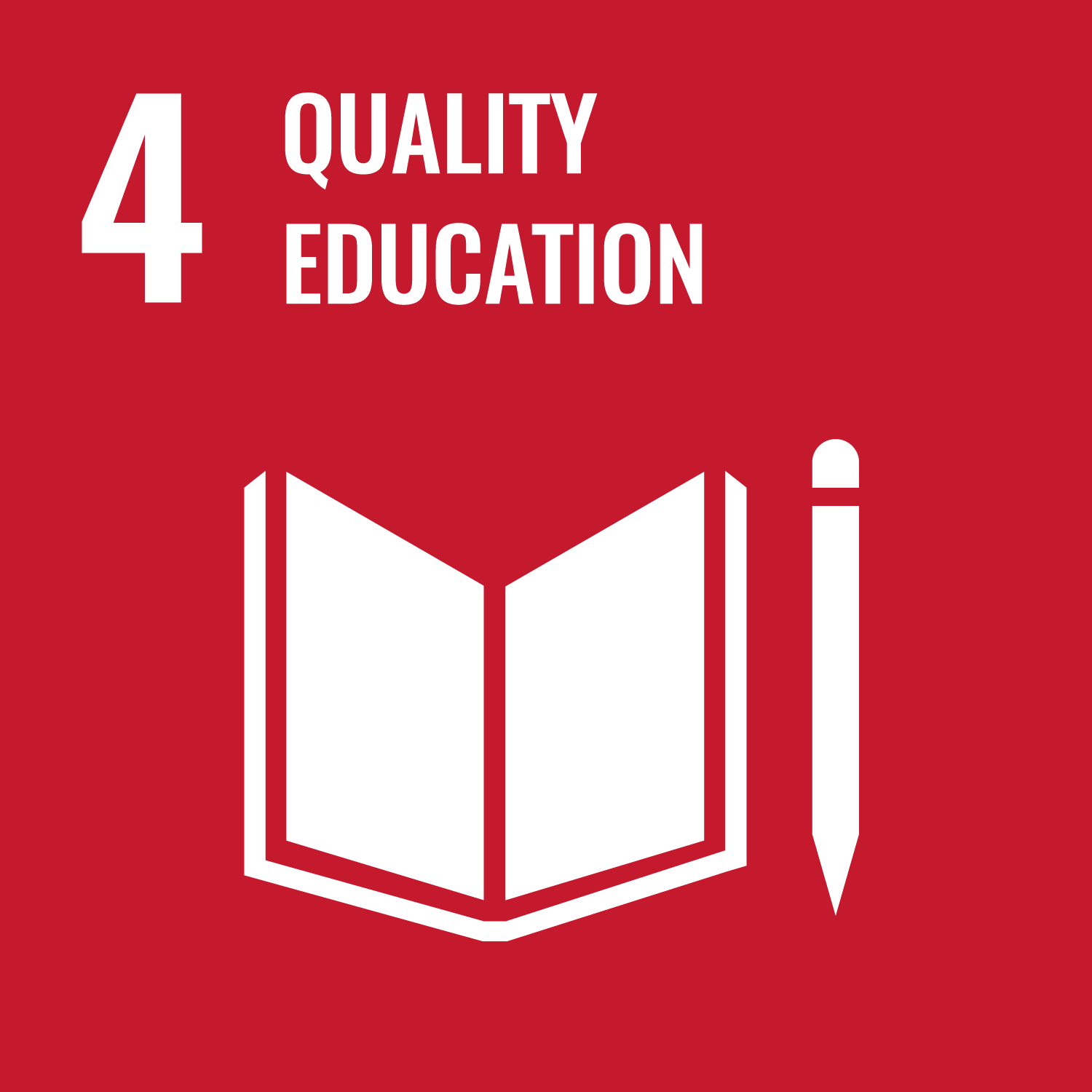SDG - Quality Education
Our commitment
The Namibia University of Science and Technology (NUST) is committed to advancing Sustainable Development Goal 4, which aims to ensure inclusive and equitable quality education and promote lifelong learning opportunities for all. This commitment is demonstrated through the University’s focus on the provision of quality education and access to lifelong learning.
NUST is committed to ensuring inclusive and equitable access to quality education through a wide range of initiatives that expand learning opportunities for all members of the community. These initiatives include free access to online courses and resources, public lectures, community outreach programmes, and the use of campus facilities. Through its open online learning platform and accessible library services, research databases, and digital resources, NUST extends knowledge beyond the campus, promoting lifelong learning, inclusivity, and academic advancement.
NUST has entered into an Agreement with the Commonwealth of Learning (COL) to support the development of Open Educational Resources (OER), Employability Frameworks/Policies, and Capacity Building at NUST. The COL collaboration will support and guide NUST in introducing OER to support employability and integrate OER into teaching and learning through policy support, advocacy, and capacity building. The initiative is coordinated by the Department of Academic and Administrative Student Support (DAASS), which oversees its implementation.
LIFELONG LEARNING MEASURES
1) Public resources (lifelong learning) - Free Access to Educational Resources for those not studying at the University.
NUST provides free access to educational resources for those not studying at the university through the following platforms:
- Free Access to Campus Facilities and Equipment: NUST extends free access to its campus facilities and equipment to public members not enrolled at the University. This demonstrates its dedication to the promotion of knowledge. Through the NUST Innovation hub, entrepreneurs/incubatees use the facilities free of charge.
- Library: Members of the public can access NUST libraries by applying for external membership. NUST allows members of the public to register and pay non-refundable membership fees to enable them to borrow educational resources. Membership fees are determined by the membership category that is chosen. This initiative promotes lifelong learning by providing broader access to a diverse range of resources. Library Membership

- The Ounongo Repository (OR) is the institutional repository of the University, administered by the library. It aims to collect, organize, manage, store, preserve, publish and make accessible worldwide, the knowledge assets or intellectual output of the University's researchers, staff, and post-graduate students. Institutional Repository

Free online Courses: NUST extends free education services beyond campus, through online courses. A Summer/Winter School on Green Hydrogen (PtX, Derivatives) Generation, Transport and Use (Fuel Cell) was one of the initiatives conducted in 2024.
2) Free access to campus facilities and equipment
NUST avails some of its campus facilities for public use:
- Venues: facilities are accessible to the public for the meetings, Seminars, and other functions.
The National Science Fair 2024 will be hosted at the Namibia University of Science and Technology
- Free access to online resources: NUST offers online resources through e-resources and digital collections.
E-resources Campus Access
3) Public Events (lifelong learning)
NUST upholds the principle of lifelong learning by offering free educational events that extend knowledge and opportunities to the broader public. Through public lectures, seminars, workshops, and community development projects, the University reinforces its commitment to knowledge dissemination, continuous learning, and community engagement. NUST News Articles ![]()
Public Lectures conducted in 2024:
- Harmonising Oil and Gas Resources: Public Lecture on Petroleum Activities in Namibia.
Public Lecture Harmonising Oil and Gas Resources Sustainable Development and Energy Security ![]()
- Green Logistics Theory and Practice: A public lecture on logistics from a complex adaptive system perspective.
Public Lecture Green Logistics Theory and Practice Complex Adaptive System Perspective ![]()
- 30x6 on Green Hydrogen: A public lecture event on Green Hydrogen.
Green Hydrogen
- Principles of Inclusive and Sustainable Urban Development: A public lecture on sustainable urban development.
Public Lecture Principles Inclusive and Sustainable Urban Development Conflicting Rationalities
- Learning from Namibia Urban transformation and people-driven urban development.
Public Lecture and Info Session
- Perspectives on Social Sustainability: Management of the Multigenerational Workforce from a German Perspective on Generation Z.
Perspectives Social Sustainability Management Multigenerational Workforce German Perspective
- From Lab to Launch - The Power of Strategic Intellectual Property (IP) Management.
Public Lecture Lab Launch Power Strategic Intellectual Property-ip Management ![]()
- Industry 4.0 and Transition in Management and Culture.
Public Lecture Topic Industry 40 and Transition Management and Culture ![]()
- Sustainable Education Practices.
Public Lecture Sustainable Education Practices ![]()
- Searching for Computing’s Soul: Professional Practice and the Future of Computing Education
- AI in Central European Advertising, PR and Journalism: A Brief Overview
- Design Activism: How We Can Have a Positive Impact on the World Through Design
Conferences/Summits/Seminars held in 2024:
- Institutional Research Week
A three-day event focused on research and innovation, featuring presentations, panels, and networking opportunities for researchers, industry leaders, and policymakers, is held annually.
2024 Institutional Research Week Programme
- Deep Learning Indaba 2024
Namibian Team Shines Deep Learning Indaba 2024 Senegal
- 8th National ICT Summit
- Thriving for Sustainability through Applying the Water-Energy-Food Nexus (WEF) Approach Short Course. From 21 to 25 October 2024, industry professionals and students from Southern Africa participated in an engaging three-day course under the theme, "Thriving for Sustainability through the Water-Energy-Food Nexus Approach".
Thriving Sustainability Through Applying Water Energy Food Nexus WEF Approach Short Course
4) Vocational training events (lifelong learning)
- Technical and Vocational Education and Training (TVET) Symposium: The event held in November 2024, under the theme ‘TVET Transformation Trends in Namibia’, was hosted by the Department of TVET under the School of Human Sciences and the Faculty of Commerce, Human Sciences and Education, and was sponsored by GIZ ProTVET. Attended by 70 in-person and over 100 online attendees, the symposium brought together stakeholders to evaluate the progress made in implementing Namibia’s 2021 TVET Policy.
- Start-up Programme: The university offers a start-up programme for entrepreneurship and business development training. Inspire to Start-Up is an accelerator programme designed to inform, spark, and capacitate potential individuals to create sustainable ventures.
Start Up Programme
The initiative is implemented through two main activities, namely:
o Building capacities in areas of: Ideation (Idea Creation, Innovate Your Idea and Idea Assessment); Market Research, Business Modelling, and Pitch & Pitch Clinic.
o Assessing the high-potential startup ideas for incubation purposes.
5) Education outreach activities beyond campus
NUST extends its educational reach beyond the main campus through regional centres and satellite campuses, providing access to communities across Namibia (Regional Centres ![]() ). Community outreach is a core activity at NUST, and as such, the University engages with communities through its community outreach Programmes. For example, Academics go to Secondary/High Schools as part of capacity development to provide tutoring to learners.
). Community outreach is a core activity at NUST, and as such, the University engages with communities through its community outreach Programmes. For example, Academics go to Secondary/High Schools as part of capacity development to provide tutoring to learners.
NUST Career Fair is an annual event that provides a platform for the NUST students to meet prospective employers in Namibia. Career Guidance ![]()
LIFELONG LEARNING ACCESS POLICY
The Namibia University of Science and Technology (NUST) operates under the Namibia University of Science and Technology Act, 2015, which outlines its objectives and governance framework. One of the core principles embedded in the Act and related institutional policies is non-discrimination and inclusivity. Similarly, NUST affirms its commitment to inclusivity and non-discrimination in the Strategic Plan 2021–2025, which outlines the university’s values and strategic objectives. The university is mandated to provide education and research opportunities that are accessible to all individuals, regardless of ethnicity, religion, gender, disability, or other status.
Policies, Procedures, Guidelines
- National Technical and Vocational Education and Training (TVET) Policy: To support life-long learning, Namibia has developed a TVET policy, to guide the transformation and implementation of TVET activities in the country. Hence, NUST offers certificates and Diplomas in Technical and Vocational Education and Training.
- General Information and Regulations 2024: This provides guidelines of our academic offering across four faculties, detailed by rules and regulations that dictate the courses you may take and the rules for academic progression. Effective from January 2019, NUST offered 7 Certificates (4 Undergraduate and 3 Postgraduate), 11 Diplomas (including 5 Postgraduate diplomas and 6 Undergraduate), 44 Bachelor degrees, 12 Professional Bachelor degrees, 25 Bachelor Honours degrees, 24 Master degrees and 6 Doctoral degrees in more than hundred programmes. This is an indication of commitment to lifelong learning
- The Research, Technology and Innovation Policy: The Namibia University of Science and Technology, values research activities and recognises research, technology, and innovation important as core functions of the University. The RTI Policy therefore provides a framework for the governance of research and development at NUST.
2024 NUST Prospectus General Rules-web


